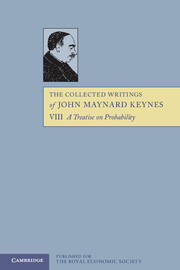Book contents
- Frontmatter
- Contents
- General Introduction
- Editorial Foreword by R. B. Braithwaite
- Editorial Note
- Preface to the First Edition
- I FUNDAMENTAL IDEAS
- II FUNDAMENTAL THEOREMS
- III INDUCTION AND ANALOGY
- IV SOME PHILOSOPHICAL APPLICATIONS OF PROBABILITY
- V THE FOUNDATIONS OF STATISTICAL INFERENCE
- 27 THE NATURE OF STATISTICAL INFERENCE
- 28 THE LAW OF GREAT NUMBERS
- 29 THE USE OF A PRIORI PROBABILITIES FOR THE PREDICTION OF STATISTICAL FREQUENCY—THE THEOREMS OF BERNOULLI, POISSON, AND TCHEBYCHEFF
- 30 THE MATHEMATICAL USE OF STATISTICAL FREQUENCIES FOR THE DETERMINATION OF PROBABILITY A POSTERIORI—THE METHODS OF LAPLACE
- 31 THE INVERSION OF BERNOULLI'S THEOREM
- 32 THE INDUCTIVE USE OF STATISTICAL FREQUENCIES FOR THE DETERMINATION OF PROBABILITY A POSTERIORI—THE METHODS OF LEXIS
- 33 OUTLINE OF A CONSTRUCTIVE THEORY
- Bibliography
- Index
33 - OUTLINE OF A CONSTRUCTIVE THEORY
from V - THE FOUNDATIONS OF STATISTICAL INFERENCE
Published online by Cambridge University Press: 05 November 2012
- Frontmatter
- Contents
- General Introduction
- Editorial Foreword by R. B. Braithwaite
- Editorial Note
- Preface to the First Edition
- I FUNDAMENTAL IDEAS
- II FUNDAMENTAL THEOREMS
- III INDUCTION AND ANALOGY
- IV SOME PHILOSOPHICAL APPLICATIONS OF PROBABILITY
- V THE FOUNDATIONS OF STATISTICAL INFERENCE
- 27 THE NATURE OF STATISTICAL INFERENCE
- 28 THE LAW OF GREAT NUMBERS
- 29 THE USE OF A PRIORI PROBABILITIES FOR THE PREDICTION OF STATISTICAL FREQUENCY—THE THEOREMS OF BERNOULLI, POISSON, AND TCHEBYCHEFF
- 30 THE MATHEMATICAL USE OF STATISTICAL FREQUENCIES FOR THE DETERMINATION OF PROBABILITY A POSTERIORI—THE METHODS OF LAPLACE
- 31 THE INVERSION OF BERNOULLI'S THEOREM
- 32 THE INDUCTIVE USE OF STATISTICAL FREQUENCIES FOR THE DETERMINATION OF PROBABILITY A POSTERIORI—THE METHODS OF LEXIS
- 33 OUTLINE OF A CONSTRUCTIVE THEORY
- Bibliography
- Index
Summary
1. There is a great difference between the proposition ‘It is probable that every instance of this generalisation is true’ and the proposition’ It is probable of any instance of this generalisation taken at random that it is true’. The latter proposition may remain valid, even if it is certain that some instances of the generalisation are false. It is more likely than not, for example, that any number will be divisible either by two or by three, but it is not more likely than not that all numbers are divisible either by two or by three.
The first type of proposition has been discussed in Part III under the name of universal induction. The latter belongs to inductive correlation or statistical induction, an attempt at the logical analysis of which must be my final task.
2. What advocates of the frequency theory of probability wrongly believe to be characteristic of all probabilities, namely, that they are essentially concerned not with single instances but with a series of instances, is, I think, a true characteristic of statistical induction. A statistical induction either asserts the probability of an instance selected at random from a series of propositions, or else it assigns the probability of the assertion, that the truth frequency of a series of propositions (i.e. the proportion of true propositions in the series) is in the neighbourhood of a given value. In either case it is asserting a characteristic of a series of propositions, rather than of a particular proposition.
- Type
- Chapter
- Information
- The Collected Writings of John Maynard Keynes , pp. 444 - 468Publisher: Royal Economic SocietyPrint publication year: 1978



